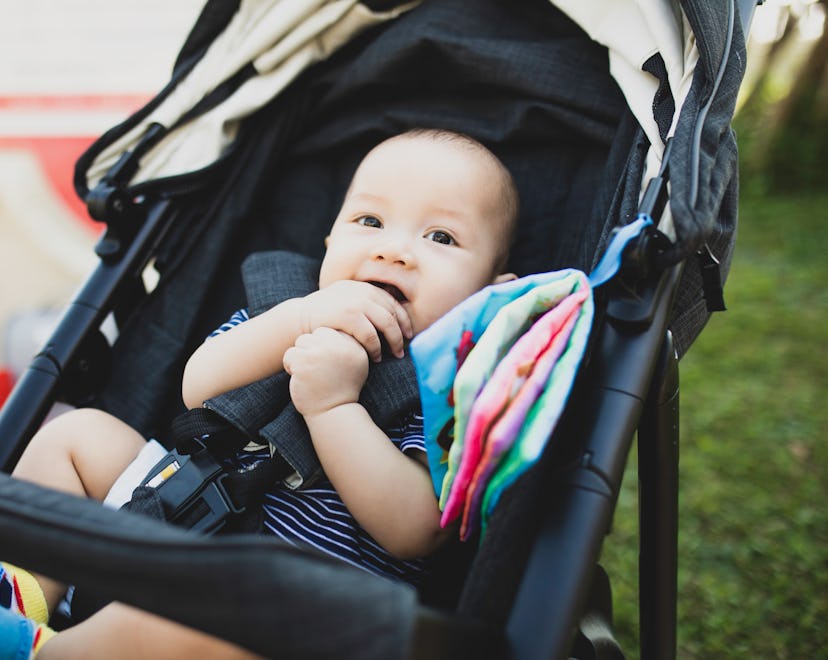Baby

6 Signs Your Baby Is Overheated, Which Can Happen Any Time Of The Year
If you see these, head back inside.
Ah, summer — the season of beach days, cookouts, and family getaways. If you have a baby this year who will be joining in on the fun, you’ll need to know the signs of overheating in babies, and what to do to cool them down quickly if you see those red flags. Especially in hotter regions — and during extreme weather events, like the 2023 heat dome over Texas — parents should be mindful of how babies’ bodies are affected by the heat, and what to do if baby is too hot.
One reason why it’s so important for parents and caretakers to know what signs of overheating in babies look like is because they are more vulnerable. “Children are more susceptible to heat exhaustion and heat stroke problems than adults because they have a body mass to surface area ratio that is smaller, so they can’t sweat as easily and can’t maintain their body temperature as well as adults,” says Dr. Amy McCollum, M.D., pediatrician at Children’s of Alabama.
“As adults, we’re aware of what’s happening [when we overheat], so of course we know we’re hot, we might go inside or get a cold drink or find some air conditioning, whereas kids can’t always recognize what’s happening nor verbalize it,” says Kristen Beckworth, MPH, manager for the Texas Children's Hospital Center for Childhood Injury Prevention.
So, even if you bring one of those clip-on stroller fans and dress baby in light clothes on really hot days, it’s still possible for their little bodies to overheat. Here are some signs your baby may be a little too hot and could use some help cooling down.
1They feel warm to the touch.
Skin that’s hot to the touch is a sign your baby is getting overheated, says Beckworth. Feel all over your little one’s body if you’re concerned about their temperature.
2Their skin is red.
Some children naturally get more red than others when they’re hot, but if you notice red or flushed skin, Beckworth says it’s probably time to head inside for some A/C.
3They seem dizzy or confused.
Getting overheated can cause some people to feel disoriented or faint, including babies. Dr. Daniel Ganjian, M.D., pediatrician at Providence Saint John’s Health Center in Santa Monica, California, recommends bringing baby into a shaded area or a cool room, removing layers, and giving them cool water (or breast milk if they are not taking water yet) to help them cool off quickly. Babies can’t tell you it’s too hot outside for them, so Ganjian says, “The rule of thumb is if you are not comfortable outside, then neither is your child.”
4They vomit.
Both Dr. McCollum and Beckworth say vomiting and diarrhea are signs that being overheated might actually be getting serious (if they didn’t have an illness causing those symptoms before, of course). The Centers for Disease Control and Prevention (CDC) recommends seeking medical help right away for heat-related vomiting.
5They’re lethargic or unresponsive.
Another sign of overheating in babies is lethargy, which can present in babies as crankiness, or unresponsiveness, according to pediatrician Ganjian. If your baby isn’t responding to your touch or tickles like they normally would, or seems less animated than usual, be sure to check their temperature and cool them off immediately. “Give your child plenty of fluids, a lukewarm bath, and call your pediatrician,” Ganjian says.
6They have a fever but aren’t sweating.
Beckworth says if your little one goes from sweating excessively to still having a high temperature, but not sweating at all, it could be a sign of heat stroke. If you notice it, definitely call your pediatrician or head to your local ER.
Remember, a baby can’t tell you when they are too hot. If you notice any signs of your baby overheating, it’s best to find some shade or head indoors, and offer them something to drink to ensure they’re hydrated, Beckworth and McCollum say. Stripping off some layers and having a room temp bath can also help, these experts say. If you’re planning outings on hot days, Beckworth encourages parents to head out in the mornings or evenings when the heat index is lower, and McCollum says remind your kids often to drink water and sip sports drinks while playing.
Experts:
Dr. Amy McCollum, M.D., pediatrician at Children’s of Alabama
Kristen Beckworth, MPH, manager for the Texas Children's Hospital Center for Childhood Injury Prevention
Dr. Daniel Ganjian, M.D., pediatrician at Providence Saint John’s Health Center in Santa Monica, California
This article was originally published on